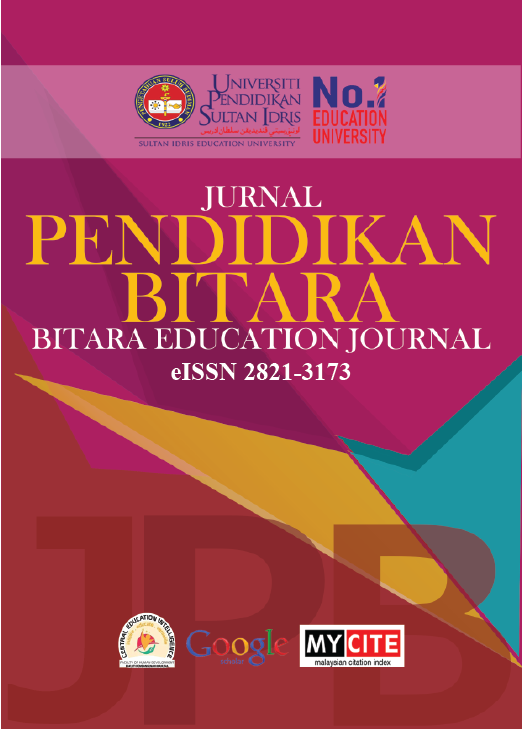A qualitative case study on handling electronic media-exposed kindergarten children: Challenges and strategies
DOI:
https://doi.org/10.37134/bitara.vol13.1.2.2020Keywords:
Personality development, Education program, Electronic Media,ChildrenAbstract
According to thestaronline.com on 10th August 2016, there seems to be a growing concern on the extensive usage of electronic media by young children in Malaysia. The purpose of this research was to analyze the methods adopted by schools in introducing intervention measures to these children. A qualitative case study approach was adapted for this research, with 3 participants, sampled through purposeful sampling. A triangulation method was adopted where data was collected through semi structure interviews, various levels of observations and examination of existing datas to generate qualitative themes. The themes found from this research were children’s executive function, role and responsibilities of the school, role and responsibilities of other stakeholders and the cause and effects of the interventions.The study found that awareness needs to be created among young parents on the tolerable level of gadget exposure. Wider dissemination of knowledge and information about the proper use of the electronic devices shall be another effort that need to be given attention. Diagnosing the cause early could also help children in getting early interventions by the school and parents while getting the necessary medical treatment.
Downloads
References
American Academic of Paediatrics. (2013). POLICY STATEMENT Children, Adolescents, and the Media, retrieved 23rd November 2019 www.pediatrics.org/cgi/doi/10.1542/peds.2013-2656 doi:10.1542/peds.2013-265
Aziz, H. (2018, Jan 2018). Two challenges confronting education. The New Straits Times Online. Retrieved fromhttps://www.nst.com.my/opinion/columnists/2018/01/320906/ two-challenges-confronting-education
Barnett, L. M., Hinkley, T. A., Okely, A. D., Hesketh, K., & Salmon, J. (2012). Use of electronic games by young children and fundamental movement skills. Perceptual and Motor Skills, 114(3), 1023-1034.
Creswell, J. W. & Poth, C. N. (2018). Qualitative inquiry and research design : Choosing among five approaches. (4th Ed.). London : Sage Publications.
Creswell, J. W. (2012). Educational research : Planning, conducting, and evaluating quantitative and qualitative research. (4th Ed.). Lincoln : Pearson.
Fazree, S. D. M. & Zakaria, S. M. (2018). The effect of gadget usage towards the development of cognitive and social among pre-schooler. Paper presented at Persidangan Kebangsaan Sarjana Muda Sains Sosial dan Kemanusiaan, Kuala Lumpur, 12 – 13 May 2018. Malaysia : Universiti Kebangsaan Malaysia.
Heim, J, Brandtzæg, P. B., Kaare, B. H., Endestad, T., &Torgersen, L. (2007). Children’s usage of media technologies and psychosocial factors. New Media & Society, 9(3), 425–454.
Kamarudin, D. (2016). Methodology (Technology). University Malaysia Pahang Publishers.
Limtrakul, N., Louthrenoo, O., Narkpongphun, A., Boonchooduang, N. & Chonchaiya, W. (2017). Media use and psychosocial adjustment in children and adolescents. Journal of Paediatrics and Child Health, Vol. 54, 296 – 301. The Royal Australasian College of Physicians.
Moawad, R. A. M. (2017). Computer tablet games’ effect on young children’s self-concept. International Education Studies, Vol. 10. Canadian Center of Science and Education.
Newman, N. F. (2018). Early childhood, media use, and development : Human touch first and foremost. Zero to Three.
Papastergiou, M. (2009) Exploring the potential of computer and video games for health and physical education: A literature review. Computers & Education, 53, 603-622.
Radesky, J. (2018). The new AAP digital guidelines : Evaluating how and why we expose children to technology. Technology and Children Exchange. Retrieved fromhttps://www.ChildCareExchange.com
Saruji, M. A. M., Hassan, N. H. & Drus, S. M. (2017). Impact of ICT and electronic gadget among young children in education : A conceptual model. Paper presented at Proceedings of the 6th International Conference on Computing and Information, Kuala Lumpur, 25 – 27 April 2017. Malaysia : Universiti Utara Malaysia.
Slutsky, R., Slutsky, M. & DeShelter, L. M. (2014). Playing with technology : Is it all bad? Dimensions of Early Childhood, Vol. 42.
William, E. (2011). Driven to distraction: How electronic media are affecting the brain and the implications for human resource development in the future. Advances in Developing Human Resources, 14(4), 626-639.
Downloads
Published
Issue
Section
License
Copyright (c) 2020 UPSI Press

This work is licensed under a Creative Commons Attribution-NonCommercial-ShareAlike 4.0 International License.





